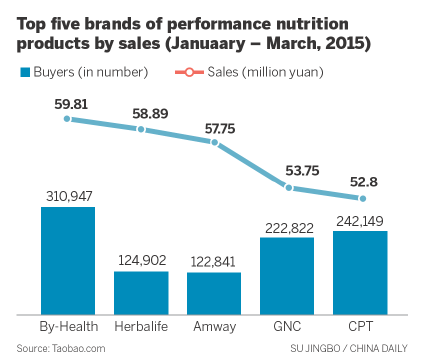Lean, mean fitness machine
By Wang Zhuoqiong (China Daily) Updated: 2015-08-17 07:52
 |
A major area of growth in the sector has been nutritional products. Companies such Glanbia Plc and Competitor Co Ltd, or CPT, are cashing in on the market, which is worth nearly 5 billion yuan. "The number of people taking nutritional products was limited in the past," Zhang, from Key-solution sports consultancy, said. "But now it is growing as more people visit gyms."
Aaron Gong is the China country manager for Glanbia Performance Nutrition China, which is part of Glanbia Plc, one of the world's leading groups in performance nutrition and food ingredients production.
The multinational company operates in more than 120 countries, is based in the Republic of Ireland and has more than 5,000 employees worldwide. While the United States is Glanbia's biggest market, demand for the firm's products have increased here among Chinese consumers, aged between 20 to 35 years old.
Last year, it reported global revenue of 3.5 billion euros ($3.85 billion), up 6.8 percent compared to 2013. The company's sports nutrition division posted revenue of 746.2 million euros, up 13.5 percent, during the same period.
"Our sales in China have doubled in the past two years since we entered the market in 2013," Gong said, without disclosing detailed figures. "There is room for great growth ... the market has immense potential."
The numbers might be small compared to the company's US business, which is a mature market, but the trend for working out among China's middle class is starting to take off. In the US, there are more than 30,500 gyms, while there are less than 6,000 here.
"Western-style training and nutritional products are starting to become increasingly popular," Gong said, adding that most of his company's products are sold at gyms or online. "Rising income levels among Chinese consumers have triggered a boom in health and fitness since 2011."
Social media is also helping to drive growth as more young and middle-aged consumers want to feel and look good.
Online forums are full of people posing in the gym or working on new fitness routines. For many, this has become a hot topic.
"People are showing off the results of their hard work," Gong said. "They talk about training programs to their friends online and their diets. Sharing these activities have encouraged more people to train and workout."
But while finding the right fitness regime might be easy, understanding what nutritional products to take to supplement a balanced diet can be like walking through a minefield. Fake products are rife, which can prove harmful, according to Zhang from Key-solution sports consultancy.
- 2015 China International Fair for Investment and Trade kicks off in Xiamen
- China's commodity imports robust in Jan-Aug period
- China stocks rebound 2.92%
- 2015 China box office already past 2014 total
- China foreign trade decline widens in August
- Interview: JP Morgan's senior executive bullish on China
- Innovation, development the focus for NZ mayors
- Lives of freelancers

















